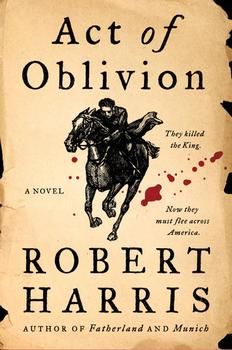Summary | Excerpt | Reviews | Beyond the Book | Read-Alikes | Genres & Themes | Author Bio

A Novel
by Robert HarrisThis article relates to Act of Oblivion
 When it comes to the execution of English royalty, perhaps the most famous are the two wives of Henry VIII who met their ends at the Tower of London — Anne Boleyn and Catherine Howard. The double execution of Louis XVI and Marie Antoinette by guillotine in France is equally if not more famous, and countless other royals have been killed by their enemies. However, only one reigning King of England has ever been publicly executed for treason: Charles I, or Charles Stuart, in 1649. This crucial event precedes the main plot in Robert Harris's Act of Oblivion.
When it comes to the execution of English royalty, perhaps the most famous are the two wives of Henry VIII who met their ends at the Tower of London — Anne Boleyn and Catherine Howard. The double execution of Louis XVI and Marie Antoinette by guillotine in France is equally if not more famous, and countless other royals have been killed by their enemies. However, only one reigning King of England has ever been publicly executed for treason: Charles I, or Charles Stuart, in 1649. This crucial event precedes the main plot in Robert Harris's Act of Oblivion.
Charles was the second son of James VI of Scotland (also James I of England) and Anne of Denmark. Charles's older brother, Henry, was primed to be the next king but fell ill and died at the age of 18. Charles was next in line and became king upon his father's death in 1626, at the age of 26.
Almost immediately, he butted heads with Parliament; his wife, Queen Henrietta Maria, was French Catholic, and the many Protestants of England were opposed to her influence over Charles, as well as the King's own religious tolerance of Catholics and his practice of high Anglicanism. He also dissolved Parliament three times, preferring to rule on his own without having to take their opinions into account, and he made poor choices involving a costly war with Spain. His refusal to negotiate with Parliament led to the English Civil War (1642-1651), fought between the Parliamentarians (supporters of Parliament) and Royalists (supporters of the monarchy). Even once he had been defeated by the Parliamentarians, captured and put on trial for treason, he refused to recognize the legitimacy of the court as he believed in the divine right of kings.
This refusal to cooperate with the court monopolized by his enemies led to his death sentence. Charles I was executed outside of the Banqueting House at the Palace of Whitehall in London on January 30, 1649. He reportedly requested a second shirt to wear so that he would not appear to be shivering from fear, and prepared a speech, though he was not able to be heard past the guards separating him from the crowds.
Regardless of whether their values aligned with the Royalists or the Parliamentarians, many of the bystanders rushed the scaffold after the king was beheaded to dip handkerchiefs into his blood, which was believed to have divine power by virtue of belonging to royalty. Considered a martyr by many, Charles was the only person to be canonized as a saint by the Anglican Church, in 1660.
Detail from A lively Representation of the manner how his late Majesty was beheaded, showing Charles I on the scaffold making a speech, via Wikimedia Commons
Filed under People, Eras & Events
![]() This "beyond the book article" relates to Act of Oblivion. It originally ran in November 2022 and has been updated for the
September 2023 paperback edition.
Go to magazine.
This "beyond the book article" relates to Act of Oblivion. It originally ran in November 2022 and has been updated for the
September 2023 paperback edition.
Go to magazine.
Your guide toexceptional books
BookBrowse seeks out and recommends the best in contemporary fiction and nonfiction—books that not only engage and entertain but also deepen our understanding of ourselves and the world around us.